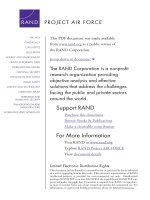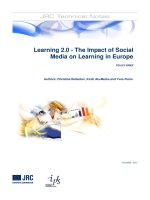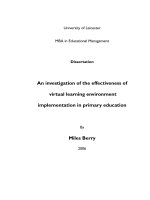The function of anxiety fear related genes in animal models
Bạn đang xem bản rút gọn của tài liệu. Xem và tải ngay bản đầy đủ của tài liệu tại đây (236.84 KB, 13 trang )
THE FUNCTION OF ANXIETY/FEAR-RELATED GENES
IN ANIMAL MODELS
THE ROLE OF CCK, 5-HT AND CRF SYSTEMS IN THE ELEVATED PLUS
MAZE, CAT EXPOSURE TEST AND FEAR CONDITIONING
WANG HONG
(MMed, BSc)
A THESIS SUBMITTED
FOR THE DEGREE OF DOCTOR OF PHILOSOPHY
DEPARTMENT OF PHARMACOLOGY
NATIONAL UNIVERSITY OF SINGAPORE
2003
Acknowledgements
i
ACKNOWLEDGEMENTS
Firstly, I wish to express my deepest appreciation and thanks to my
supervisor, Dr. Zhu Yi Zhun, Department of Pharmacology, NUS, for his excellent
guidance and immense support throughout the course of this study.
Secondly, I would like to thank my co-supervisor, Associate Professor
Shabbir M Moochhala, Defence Medical Research Institute, Singapore, for his
proficient guidance and constant encouragement throughout the course of this study.
Thirdly, I would also like to thank my co-supervisor, Professor Joachim
Spiess, Department of Molecular Neuroendocrinology, Max Planck Institute for
Experimental Medicine, Germany, for his expert direction and stimulating discussion
throughout the course of this study.
Associate Professor Wong Tsun Hon, Peter and Associate Professor Tan
Chay Hoon, Department of Pharmacology, NUS, are highly appreciated for their
invaluable help in the research work and the preparation of paper publication.
I am very grateful to Mr. Cedomir Todorovic, Max Planck Institute for
Experimental Medicine, Germany, for his patient instruction and great help in the
animal behavior study in Germany. Mr. Justin Mohamed Farook, Department of
Pharmacology, NUS, is acknowledged for the behavior work in Singapore.
I would also like to thank Dr. Thomas Zeyda, Dr. Jelena Radulovic and Ms.
Christina Schrick, Max Planck Institute for Experimental Medicine, Germany, for
their helpful suggestion, valuable discussion and technical support.
I am greatly thankful to my parents and brother for their complete support
throughout my career.
Acknowledgements
ii
Last, I would like to express my intense appreciation and thanks to my
beloved husband, Chen Hui, for his full support and continual encouragement in the
past 10 years.
This work was supported by grants from the National University of
Singapore (R-184-000-033-214), Defense Medical Research Institute (P46-1-1/99),
Singapore, and Max Planck Institute for Experimental Medicine, Germany.
Publications iii
PUBLICATIONS
1. Wang H, Zhu YZ, Moochhala S, Farook JM, Lee LK, Wong PT. Gene
expression of CCK
2
and serotonin receptors in SD rats exhibiting high and
low anxiety in the elevated plus maze. 2003, submitted.
2. Wang H, Zhu YZ, Farook JM, Moochhala S, Teo AL, Lee LK, Wong PT.
Genetic variations in CCK2 receptor in PVG hooded and Sprague-Dawley
rats and its mRNA expression on cat exposure. Behav Neurosci 2003, 117(2):
385-90.
3. Wang H, Zhu YZ, Wong PT, Farook JM, Teo AL, Lee LK, Moochhala S.
cDNA microarray analysis of gene expression in anxious PVG and SD rats
after cat-freezing test. Exp Brain Res 2003, 149(4): 413-21.
4. Wang H, Zhu YZ, Tang YK, Lau G, Moochhala S, Tan CH. Gene expression
of serotonin receptor subtypes and cholecystokinin-B receptor in suicide
patients. J Neurochem 2001, 77 (Supp 1): 53.
5. Farook JM, Zhu YZ, Wang H, Moochhala S, Lee L, Wong PT. Strain
differences in freezing behavior of PVG hooded and Sprague-Dawley rats:
differential cortical expression of cholecystokinin2 receptors. Neuroreport
2001, 12(12): 2717-20.
6. Zhu YZ, Moochhala S, Wang H, Farook JM, Greengrass CJ, Teo WL, Lee
HS, Lee EJD, Wong PT-H. Up-regulation of gene expression in rats that
showed high anxiety on the elevated plus-maze. Singapore Medical Journal
2000, 41(3): 25-27.
Table of Contents iv
TABLE OF CONTENTS
ACKNOWLEDGEMENTS
PUBLICATIONS
TABLE OF CONTENTS
ABBREVIATIONS
SUMMARY
CHAPTER 1: INTRODUCTION
1. Anxiety and fear
1.1. D
EFINITION
1.2. Anxiety disorders
2. Cholecystokinin (CCK) and its receptors
2.1. CCK: a neurotransmitter
2.1.1. Discovery of CCK and its molecular forms
2.1.2. Distribution of CCK-related peptides in the central nervous
system
2.2. CCK receptors
2.2.1. Characterization of two CCK receptor subtypes: CCK
1
and
CCK
2
2.2.2. Distribution of CCK receptors
2.2.3. The molecular biology of the CCK
1
and CCK
2
receptors
i
iii
iv
viii
x
1
1
1
2
3
3
3
4
5
5
6
8
Table of Contents v
2.3. Function of CCK-related peptides and CCK receptors
2.3.1. Role in anxiety
2.3.2. Role in memory process
3. 5-HT and its receptors
3.1. Introduction
3.2. 5-HT and anxiety
3.3. 5-HT receptor subtypes
3.3.1. 5-HT1 receptors
3.3.2. 5-HT2 receptors
3.3.3. 5-HT3 receptors
3.3.4. Other 5-HT receptors
4. CRF and CRF receptors
4.1. Structure and distribution of CRF-like peptides
4.2. CRF receptor subtypes
4.2.1. Characterization of two CRF receptor subtypes: CRF
1
and
CRF
2
4.2.2. CRF receptor expression in the mammalian CNS and
periphery
4.2.3. Pharmacology of CRF
1
and CRF
2
receptors
4.3. CRF-binding protein
4.4. Role of the CRF system in anxiety
4.4.1. CRF and anxiety
4.4.2. Role of CRF
1
receptors in anxiety
4.4.3. Role of CRF
2
receptors in anxiety
9
10
13
14
14
15
16
17
20
22
24
25
25
27
27
28
29
30
31
31
33
35
Table of Contents vi
4.5. Role of the CRF system in memory and learning
5. Animal Models
5.1. Introduction
5.2. Validity criteria of an animal model
5.3. Elevated plus maze test
5.4. Cat exposure test
5.5. Fear conditioning
6. The hypothesis of this study
CHAPTER 2: Gene expression of CCK
2
and serotonin receptors in SD
rats exhibiting high and low anxiety in the elevated plus maze
CHAPTER 3: Differences in behavior profile and gene expression of
CCK
2
receptor in PVG hooded and SD rats in cat exposure
CHAPTER 4: cDNA microarray analysis of gene expression profile in
anxious PVG and SD rats after cat exposure
CHAPTER 5: Differences in the effect of CCK
2
receptor agonist CCK4
and antagonist LY225910 in PVG hooded and SD rats on cat exposure
CHAPTER 6: Genetic variations of CCK
2
receptor in PVG hooded and
SD rats
37
39
39
40
42
44
46
48
50
64
74
89
97
Table of Contents vii
CHAPTER 7: The crosstalk between CCK and CRF systems in anxiety
and fear conditioning
CHAPTER 8: C
ONCLUSIONS AND FUTURE WORKS
REFERENCES
LIST OF TABLES/FIGURES
TABLES
FIGURES
107
121
127
161
164
171
Abbreviations viii
ABBREVIATIONS
5-HT
serotonin, 5-hydroxytryptamine
ACTH
adrenocorticotropic hormone
AD
Alzheimer's disease
ahCRF
alpha-helical CRF
AMV-RT
avian myeloblastosis virus reverse transcriptase
anti-Svg-30
anti-sauvagine-30
Arc
rat activity-regulated cytoskeleton-associated gene
BZ
benzodiazepine
cAMP
cyclic adenosine monophosphate
CCK
cholecystokinin
CNS
central nervous system
CORT
corticosterone
CRF
corticotropin-releasing factor
CRF-BP
CRF-binding protein
CS
conditioned stimulus
CSF
cerebrospinal fluid
DA
dopamine
DEPC
diethylpyrocarbonate
DMSO
dimethyl sulphoxide
dNTP
deoxyribonucleoside triphosphate
EPM
elevated plus-maze
ESTs
expressed sequence tags
F/A DTB
Fear/anxiety Defence Test Battery
FGF
fibroblast growth factor
GABA
γ-aminobutyric acid
GAD
generalized anxiety disorder
GPCRs
G-protein coupled receptors
h/rCRF
human and rat CRF
HPA
hypothalamic–pituitary–adrenal
Abbreviations ix
i.c.v.
intracerebroventriculus
i.h.
the dorsal hippocampus
i.s.
the lateral intermediate
septal area
IEGs
immediate-early genes
LC
locus coeruleus
MAP
microtubule-associated protein
NA
noradrenaline
NGFI-A
rat nerve growth factor-induced gene A
oCRF
ovine CRF
PET
positron emission tomography
PTSD
post-traumatic stress disorder
RT-PCR
reverse transcription-polymerase chain reaction
SD
Sprague-Dawley
SVG
sauvagine
UCN
urocortin
URO
urotensin
Summary
x
SUMMARY
The significance of anxiety or fear in health and disease is well recognized
today, but the underlying cell biological and molecular mechanisms are not clear due
to the observation that various neurotransmitters and neuromodulators affect anxiety.
Our study tested the involvement of CCK, 5-HT and CRF systems in anxiety and
fear processes and their crosstalk in the central nervous system.
Elevated plus maze is a well-validated animal model of anxiety. Two groups
of rat: high- and low-anxiety, were chosen from 88 SD rats according to the
percentage of time spent in the open arms. After RT-PCR amplification of CCK
2
and
5-HT receptor subtypes, CCK
2
receptor mRNA expression was found to be
significantly higher in the cortex and cerebellum of the high-anxiety group as
opposed to the low-anxiety group and 5-HT receptor subtypes were expressed in the
altered expression pattern in the various brain regions.
As exposure to the elevated plus maze is a relatively mild stimulus for rats,
another animal model/the cat exposure test, and two rat strains/PVG hooded and SD
rats, were employed in the following study. SD rats were in a low-anxious state,
while PVG hooded exhibited highly anxious behavior when exposed to the cat. RT-
PCR results showed that the expression of CCK
2
receptor mRNA tended to be higher
in PVG rats compared with SD rats and significantly so in the cortex and
hippocampus. A cDNA microarray consisting of 5,931 genes was employed to
analyze the gene expression profiles between the cortex of anxious PVG hooded and
SD rats after cat exposure. We detected 16 up-regulated and 38 down-regulated
genes between PVG hooded and SD rats. Some of these genes have not yet been
Summary
xi
associated with anxiety (e.g. fibroblast growth factor, FGF), while other genes were
recently found to be expressed in an anxious state (e.g. rat nerve growth factor-
induced [NGFI-A] gene). The expression of three genes was confirmed by RT-PCR.
The treatment of a CCK
2
agonist (CCK4) or antagonist (LY225910) showed
different effects in two rat strains on cat exposure. However, there was no significant
alteration of CCK
2
receptor gene expression in the cortex and hippocampus of
control, agonist- and antagonist-treated groups. In addition, four variations were
detected in the coding region of CCK
2
receptor gene in PVG hooded and SD rats.
We shifted the behavior study from rats to mice in the last part of this project,
as this will allow us to compare the difference between wild type and knockout mice.
CCK4 was found to induce an anxiogenic effect in C57BL/6J mice on the elevated
plus maze after intracerebroventricular (i.c.v.) or i.h., but not i.s. injection. This
effect could be blocked by pretreatment with the CCK
2
receptor antagonist CR2945
or the CRF receptor antagonist (Glu
11,16
)-astressin. I.c.v. injection of CCK4 before
training, but not after training, reduced the freezing behavior of mice on both
context- and tone-dependent fear conditioning. This impairment could be blocked by
the pretreatment with (Glu
11,16
)-astressin 15 minutes before the application of CCK4,
while injection of (Glu
11,16
)-astressin alone did not exhibit any significant effect. The
finding that (Glu
11,16
)-astressin could block the CCK4 effects suggested that CRF
receptors mediate CCK4 actions at least in part.
In summary, our experiments demonstrated that the CCK system is involved
in anxiety and fear memory. 5-HT, like CCK, is also anxiety-related and might be
involved in the physiological functions of the CCK system. Moreover, the crosstalk
Summary
xii
between the CCK and CRF systems may play an important role in anxiety and fear
conditioning.









